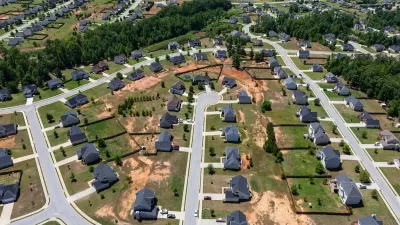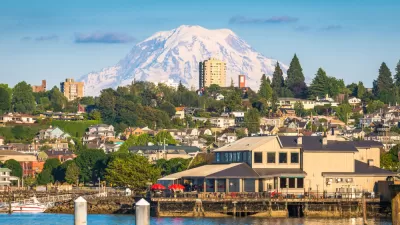Mass upzoning could give developers and homeowners the flexibility to build new housing where it's most needed.

With zoning reform efforts underway in cities and states around the country, Daniel Herriges undertakes the question of how blanket upzoning would actually affect property values.
Herriges focuses on the push to "upzone everything a little" by legalizing the construction of middle-density housing such as fourplexes and Accessory Dwelling Units (ADUs) on single-family lots, which some critics fear will lead to rampant speculation and redevelopment by investors.
According to Herriges, zoning can only restrict development potential, not create it. Rather, "What creates that potential is genuine demand for the product: the finished building." In other words, upzoning will only result in development in places where the demand for development is already there. "Zoning does act as a limiting ingredient in places where more intense development would be economically viable right now: where there would be many ready buyers if it simply weren't illegal."
With zoning restrictions, cities build up unmet demand that drives up housing costs and drives residents to seek out more affordable peripheral areas, encouraging sprawl. Herriges supports "broad but incremental upzoning" that will allow development to occur where demand—and potential profits—are highest, redistributing "where that development happens, on balance away from the suburban fringe and a small handful of hot neighborhoods."
FULL STORY: What Would Mass Upzoning *Actually* Do to Property Values?

Planetizen Federal Action Tracker
A weekly monitor of how Trump’s orders and actions are impacting planners and planning in America.

Map: Where Senate Republicans Want to Sell Your Public Lands
For public land advocates, the Senate Republicans’ proposal to sell millions of acres of public land in the West is “the biggest fight of their careers.”

Restaurant Patios Were a Pandemic Win — Why Were They so Hard to Keep?
Social distancing requirements and changes in travel patterns prompted cities to pilot new uses for street and sidewalk space. Then it got complicated.

Albuquerque Route 66 Motels Become Affordable Housing
A $4 million city fund is incentivizing developers to breathe new life into derelict midcentury motels.

DC Area County Eliminates Bus Fares
Montgomery County joins a growing trend of making transit free.

Platform Pilsner: Vancouver Transit Agency Releases... a Beer?
TransLink will receive a portion of every sale of the four-pack.
Urban Design for Planners 1: Software Tools
This six-course series explores essential urban design concepts using open source software and equips planners with the tools they need to participate fully in the urban design process.
Planning for Universal Design
Learn the tools for implementing Universal Design in planning regulations.
Heyer Gruel & Associates PA
JM Goldson LLC
Custer County Colorado
City of Camden Redevelopment Agency
City of Astoria
Transportation Research & Education Center (TREC) at Portland State University
Camden Redevelopment Agency
City of Claremont
Municipality of Princeton (NJ)





























